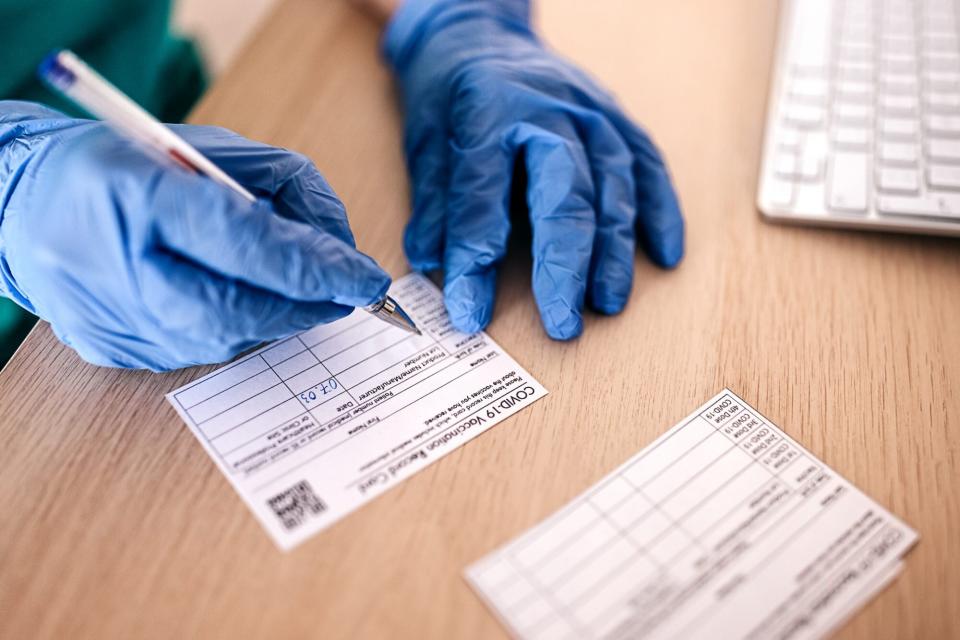Everything You Need to Know About Your COVID-19 Vaccine Card

With mass vaccinations underway and broadened eligibility windows (every American over the age of 16 will soon be able to receive their shot), many U.S. citizens feel as if the light at the end of the tunnel is finally within view. Over 14 months after the COVID-19 pandemic upended life as we knew it, hope has dawned in form of a small, white, rectangular piece of paper: a vaccination card. Ahead, everything you need to know about yours, including how to keep it safe, what to do if you lose it, and whether or not you should be carrying it with you at all times, according to health experts.

Getty / mixetto
What is a vaccine card?
This is the very same card you received (or will receive) at your vaccination site after your first shot (or only shot, should you have been given Johnson & Johnson's formula) was administered to you; the piece of paper includes the vaccine's manufacturer and your dose's lot number as well as the date and location of your vaccinations, explains Rachael Lee, M.D., an assistant professor in the Division of Infectious Diseases at the University of Alabama at Birmingham and UAB's Healthcare Epidemiologist. "This card is not only proof that you received the shot, but also helps you keep track of your vaccine information and when to get the second dose at the right time," she says.
What does a vaccine card do?
The purpose of this card is to grant an individual access to places that are restricted to only those who have been vaccinated, explains Soumi Eachempati, M.D., the co-founder and CEO of Chelsea Health Solutions and Cleared4. "At the moment, it is still unclear which places will require or choose to use vaccination cards, but the list could include public spaces such as restaurants, movie theaters, or sporting and entertainment venues," he says. "Additionally, the travel industry could use these cards to validate international travel via airlines or cruises."
How can you keep your vaccine card safe?
Because vaccination cards may eventually be required for allowance into certain facilities or for travel purposes, it is critical to keep yours safe; consider it a key part of your personal medical record. Robert Hess III—a public health expert and the CEO of Hess III Consulting, a company that helps optimize hospital networks—recommends sharing a copy with your primary care physician's office to ensure it is part of your permanent history. At home, he recommends protecting the card (ideally in a plastic sleeve, as there are mixed reports about whether or not vaccination cards should be laminated) and placing it in a locked box, safe, or other secure spot where you won't lose it. "Individuals should absolutely store it however they store other medical records—and also take a picture of it to keep in your phone," he adds.
Currently, there is no government database automatically tracking personal vaccination data—but Hess points out that individuals may voluntarily report their vaccination to the federal government, along with any side effects they experience. There are also several apps and websites available to store vaccination information—platforms, like Care Cloud, that Hess says have existed for years. Known largely as "personal health records," they keep your medical information at your disposal, so you don't have to request documents from your doctor's office.
What should you do if you lose yours?
If you lose your card, says Sunitha Posina, M.D., a New York City-based internist, reach out to your vaccination site; they will have a record of your shot and should be able to replace it. If you can't get a hold of the facility—or if it has since closed—she recommends reaching out to your state's Immunization Records department. "All vaccinations are required to be reported [there], so they should have the records in their Immunization Information System (IIS)," she adds.
Should you carry it around with you?
If you know your community pool or local gym requires proof of vaccination in order to enter or participate, Hess recommends keeping a protected copy of your card with you. Leave the original at home, he urges, unless bringing it along is absolutely necessary.
Will taking your vaccine card with you be something that becomes standard?
Experts are predicting that vaccine cards will become prized possessions over the next few months, especially when it comes to attending large-scale events such as sports games and concerts; they will also likely play a role in international travel of any kind.
What might be surprising to some Americans is that requiring proof of vaccination when traveling is not new. "Vaccine cards for Yellow Fever are used for international travelers voyaging to certain parts of South America and Africa; some countries require proof of vaccination with a signed and stamped International Certificate of Vaccination," adds Dr. Lee. As we see an eventual return to normal, and a gradual decline of the pandemic, she predicts that some countries will request proof of COVID-19 vaccination for entry; what this will look like will vary by country, she notes. In the future, she recommends discussing vaccination requirements with travel clinic providers who understand the details; some places, she adds, may prefer tangible proof—your original card—over an electronic copy, making it more important than ever to keep yours in pristine condition.
To learn more about the COVID-19 vaccine and how to prepare for your vaccination appointment, visit the Center for Disease Control and Prevention's website.